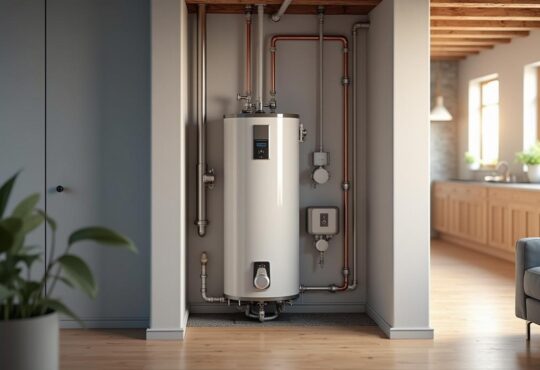
Does Home Warranty Cover Plumbing for Homeowners?
Discover how plumbing issues for homeowners are addressed by a home warranty. If you’ve ever dealt with a burst pipe or a stubborn leak, you know how stressful and expensive repairs can become. A reliable contract from a home warranty provider may help defray those costs, so you don’t have to scramble for funds when the unexpected arises. Many people want to understand what home warranty plans typically include and how they compare to other protection options.
Contents
Why Plumbing Coverage Matters for Homeowners
Plumbing plays a central role in keeping a household running smoothly. When drains back up or waterlines crack, daily tasks turn chaotic and can lead to costly structural damage. A home warranty for plumbing often steps in where basic home insurance might fall short, giving you peace of mind and financial cushioning.
Some warranties bundle plumbing coverage with other areas such as appliance repair coverage, creating a more comprehensive property protection safeguard. By pairing residential warranty coverage with home insurance, you’ll reduce the stress of unexpected repairs, since each policy focuses on different kinds of problems.
Addressing Common Plumbing Problems
Leaky faucets can drive your water bill up. Burst pipes can wreak havoc in walls and floors. A house warranty that includes systems coverage typically addresses these plumbing headaches, providing an option for maintenance coverage before small issues become major disasters. Read through home warranty reviews to see how quickly claims are handled and how effective the contractor repair service is for plumbing. Those details can greatly influence your overall satisfaction with your home warranty policy.
Typical Coverage in Home Warranty Plans
Many home warranty services outline specific plumbing repairs under their systems repair coverage. Commonly covered fixes include clogged pipes, faulty sewer lines, and broken water heaters. However, you’ll want to verify that your affordable home warranty actually addresses these areas, since each company takes a slightly different approach.
When considering a home warranty comparison, look for one that addresses both plumbing and appliance coverage. The best home warranty typically offers a balanced blend of home systems protection and appliance repair coverage, making replacement parts and labor more accessible. You’ll save time and hassle if you can rely on a single warranty service provider to handle multiple home repairs rather than juggling separate policies or searching for an independent contractor on short notice.
What to Expect with a Home Warranty for Plumbing
Not every plan will be identical, but most home warranty for plumbing options cover fixtures like toilets, showers, and internal water lines. Some companies even provide coverage for stoppages in the main drain if they are within the foundation of your property. If the provider refuses to fix certain issues without a service fee, see if you can upgrade your home protection plan to handle potential high-cost repairs. Always read the fine print about how to file a home warranty claim process to ensure repairs are authorized properly.
How Home Warranty Works vs Homeowners Insurance
It’s easy to assume your standard home insurance policy will cover any water-related mishap. While homeowners insurance can protect you from damage caused by emergencies like flooding or burst pipes, it usually doesn’t help pay for routine plumbing repairs or replacements due to age or normal wear. That’s where the concept of a home repair insurance plan merges with a home warranty vs homeowners insurance discussion. One focuses on sudden disasters, while the other covers day-to-day breakdowns and mechanical failures.
Another essential factor to consider is the difference between property warranty coverage and real estate warranty options that some sellers offer when you purchase a home. The latter might only include minimal plumbing safeguards, so make sure to evaluate your specific needs. If your property has older pipes, then a robust systems coverage adds valuable homeowner protection.
Filing a Home Warranty Claim Process
When something goes wrong, you contact the warranty service provider to open a claim. They typically send a licensed contractor repair service to evaluate and fix the issue, provided it’s within the coverage terms. Keep receipts and any relevant documents to streamline the process. The more you know about what does home warranty cover, the smoother your experience will be. Clear communication and prompt response times often indicate the warranty company’s commitment to customer satisfaction.
Common Exclusions and Limitations
Even the best home warranty might not cover everything. Some companies list home warranty exclusions such as pre-existing problems, cosmetic damage, or items not properly maintained. If the pipes in your home are severely corroded, you need to check whether your home warranty insurance will still handle leaks, or if they’ll deem it a maintenance issue.
Hidden costs may also pop up. For example, some plans limit coverage if your plumbing system doesn’t meet certain building codes. Carefully review the service call fee, maximum payout limits, and any local code violation issues before you settle on a home warranty policy. Comparing different home warranty plans will give you a better sense of each provider’s stance on older or more complex plumbing configurations.
Avoiding Surprises in Your Residential Warranty
If you fail to note the fine print, you may get stuck with out-of-pocket expenses when you least expect it. Reviewing your home warranty cost carefully before you sign is essential. Some providers appear affordable at first but pack in expensive service fees. Asking questions upfront and reading multiple home warranty reviews can head off unpleasant revelations later.
Budget Considerations and Renewing Home Warranty
Home warranty cost varies significantly based on factors like property size, location, and coverage levels. Opting for premium plans can raise your monthly bills but might save you thousands if a major plumbing breakdown occurs. Make sure you strike the right balance between affordability and peace of mind, particularly if you have an older system prone to leaks or backups.
When renewing home warranty coverage, you can switch providers if you aren’t satisfied with the service, or if another company offers a more appealing price for all your critical systems. At renewal time, evaluate whether you’re still getting the most from your warranty service provider. Some companies adjust terms each year, so you might find your original plan no longer meets your household’s needs.
Finding the Best Home Warranty Services
If you’re shopping for a plan that includes comprehensive coverage, look at a variety of factors like reputation, cost, claim response, and contractor availability. Focus on how to choose a home warranty by identifying what matters most for your home’s plumbing and other systems. A plan tailored to your situation ensures you’ll have minimal disruption when a leak or clog occurs. In doing so, you can keep your property in prime shape and minimize repair hassles.
Researching home warranty satisfaction is worthwhile, especially because plumbing issues can turn catastrophic. If something goes wrong beneath your sink or in your walls, it’s comforting to know you have a backup plan. A solid home warranty comparison will guide you to a provider that prioritizes quick, high-quality plumbing service and values your long-term relationship.





 Hi I'm Joe.
Hi I'm Joe. 